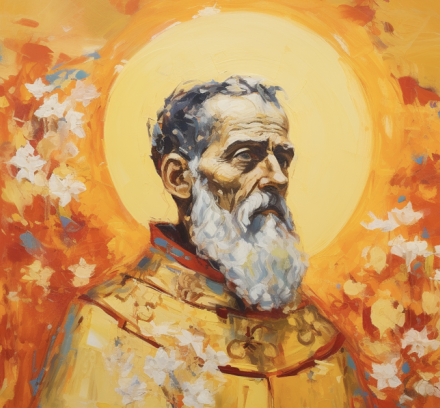Saints Saint Isidore of Seville
Saint Isidore of Seville, a revered Doctor of the Church, is often called the last of the Church Fathers. His works spanned a broad spectrum, from theology and philosophy to history, etymology, and education. His life and works had a profound influence on the Middle Ages and continue to inspire Catholics today.

Born around 560 AD in Cartagena, Spain, to a family of saints, Isidore was well placed to receive a robust Christian upbringing. His parents, Severianus and Theodora, were known for their piety and virtue, while his siblings Leander, Fulgentius, and Florentina, were all recognized as saints.
After the death of his parents, Isidore was placed under the care of his elder brother Leander, the Bishop of Seville. Leander, recognizing his brother's brilliance, ensured Isidore received an excellent education, ranging from the liberal arts to theology.
Following Leander's death, Isidore was chosen to succeed him as Bishop of Seville in 601 AD. He proved to be an effective and energetic bishop, giving himself fully to the service of his flock. Isidore worked diligently for the Church, promoting monasticism, establishing seminaries in every diocese, and insisting on a high standard of education for clergy.
One of the major highlights of Isidore's episcopal career was his pivotal role in the Fourth National Council of Toledo in 633 AD. As the driving force behind the council, he helped unify the Church in Spain and reinforce Catholic orthodoxy against the encroaching threat of Arianism.
In terms of his scholarly work, Saint Isidore’s magnum opus, the "Etymologies" (also known as the "Origines"), is a remarkable 20-volume encyclopedia that aimed to compile all secular and religious knowledge of his time. The work covers topics such as God, angels, humans, animals, theology, law, and many more. It served as a vital reference work throughout the Middle Ages and underlined Isidore's commitment to the preservation and promotion of learning.
Isidore’s other notable works include his "History of the Goths, Vandals, and Suebi", which provides valuable insights into the early medieval period in Spain, and his writings on divine and human nature, in which he intertwined Biblical exegesis with Neoplatonic philosophy.
Saint Isidore died on April 4, 636 AD. His remarkable contributions to education, theology, and the Church have cemented his legacy. He was canonized by the Catholic Church, and in 1722, Pope Innocent XIII declared him a Doctor of the Church. He is often invoked as the Patron Saint of the internet and computer users due to his desire to use the best of all knowledge to seek and serve God.
In today’s rapidly changing digital age, Saint Isidore of Seville stands as a potent reminder of the harmony between faith and reason, the sacred and the secular. His life invites us to see all learning as a pathway to the divine, and his deep piety encourages us to love God with all our hearts and minds. His Feast Day is April 4th.
Learn more about The Saints.